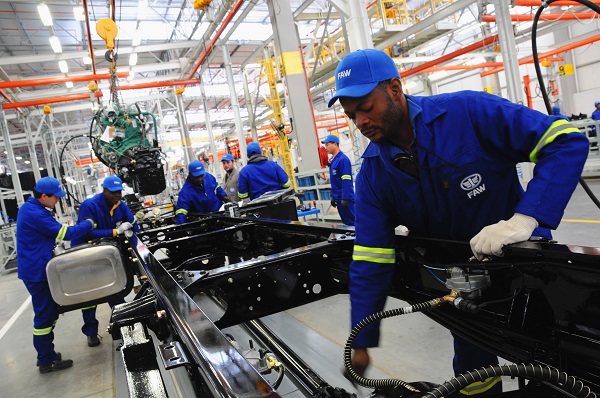

Follow us on:  
|

Increase is despite y/y decline in the final two months of 2017

The record bulk exports confirm that the South African economy has exited recession, analysts say [Xinhua]
The record bulk exports confirm that the South African economy has exited recession and is on its way to surprising most economists with its renewed vigour.
The annual increase was despite a 5.0 per cent y/y drop in December and a 7.7 per cent y/y fall in November as it had been preceded by a 30.7 per cent y/y surge in October to a record monthly 16.7 Mt.
The October 2017 record was set despite a severe storm that disrupted port operations in KwaZulu-Natal.
Although Richards Bay exported more than half South Africa’s total bulk exports, 2017 was the second consecutive year of slippage. Bulk exports out of Richards Bay, which are mostly coal, eased by 1.8 per cent in 2017 to 88.8 Mt after slipping by 2.8 per cent in 2016 to 90.4 Mt and jumping by 8.2 per cent in 2015 to 93 Mt.
Operational improvements on the coal link to the Mpumalanga coal fields should push exports back above the 90 Mt level in 2018.
Economists wonder why Richards Bay cannot consistently export at the record monthly tonnage of 9.5 Mt achieved in November 2016, which is equivalent to an annual 114 Mt. Surely if you can achieve it once, then you can do so again and again.
The answer to this will be given in the IHS Markit South African Coal Export Conference in Cape Town from 31 January to 2 February. Now in its 13th year, the conference aims to address the issue of South Africa lagging behind its BRICS peer of Brazil, as well its other main bulk commodity exporter competitor, Australia.
Policy uncertainty and logistics constraints meant that South Africa lost out on the 2003 to 2008 commodity price boom with annual bulk exports increasing by a mere 2.8 Mt between those two years.
Since then there has been a marked turnaround due to better policy co-ordination between mining companies and state-owned Transnet, so that volumes have improved by 45 per cent or 52.3 Mt between 2008 and 2015, but policy uncertainty about mineral rights and share ownership is hampering capacity expansions.
To address these investor concerns the Minister of Mineral Resources, Mosebenzi Zwane, will give the welcoming keynote address at the Investing in African Mining Indaba in Cape Town on 5 February. The Indaba is the world’s largest mining investment conference and has been hosted by Cape Town for more than 20 years.
The Ministerial Symposium on 4 February is the only event on the African continent that engages the most prominent mining company CEOs with 35 due to attend this year’s event, as well as 18 African Mining Ministers and the major industry organisations and multilaterals such as the World Bank Group, United Nations Economic Commission for Africa, Chamber of Mines South Africa and the African Development Bank.
Mining companies want policy certainty, while governments want mining companies to pay their fair share and encourage inclusive economic growth. The Symposium is aimed at achieving a mutually beneficial solution.
Helmo Preuss in Grahamstown, South Africa for The BRICS Post